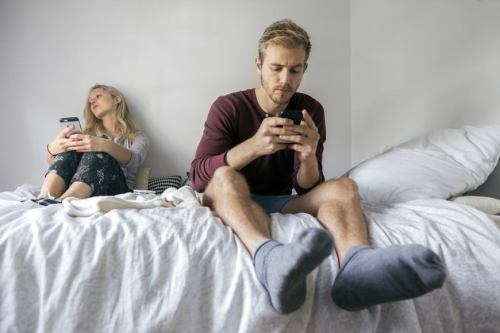How To Deal When Your Partner Has a Lower Sex Drive Than You (Or Vice Versa)
It's normal for your sex drive to fluctuate, but how do you deal with expectations and desires? Experts explain how to handle mismatched libidos, both naturally occurring and caused by antidepressants.

In a long-term relationship, how often should you want to have sex? What about your partner? What’s, for lack of a better word, normal?
“It’s totally normal not to be at the same level of desire, and it fluctuates,” says Shannon Chavez, PsyD, a Los Angeles-based psychologist and AASECT-certified sex therapist. “We can be the high-desire partner one week, then low-desire the next.”
This “problem,” of course, is widespread and nothing new. In 2015, a set of studies published in the Personality and Social Psychology Bulletin found that 80 percent of people had experienced a desire discrepancy with their partner in the past month and that most couples had some imbalance on five out of seven days a week.
But while sex drives naturally vary, sometimes external factors can contribute to the lack of, er, fire down there.
Keep reading to learn why you and your partner seem to be operating on different schedules—and how to deal.

Managing mismatched libidos
The stereotypical assumption is that women want to have less sex than men, but Dr. Chavez says the gender breakdown of low desire in her practice is about 50/50—and over half of the couples she sees are looking for ways to better handle desire discrepancy. Her first step is to help them let go of unrealistic expectations of perfectly-aligned libido. “I tell them that the goal isn’t to be able to ‘match’ the high-libido partner. It’s being able to negotiate and compromise without being reactive.”
“The goal isn’t to be able to ‘match’ the high-libido partner. It’s being able to negotiate and compromise.” —Shannon Chavez, clinical psychologist and sex therapist
One basic exercise Dr. Chavez recommends is for each partner to write a list of their turn-ons, both in and out of the bedroom. “Maybe you’re most aroused right after a workout, or when you just accomplished something you’ve been meaning to do,” she says. Then, with Dr. Chavez’s help, the couple shares their lists and comes up with an “erotic menu” of new sex ideas.
Our sex drive is like our hunger drive, Dr. Chavez explains—it’s hard to get excited if you’re eating the same thing every day. “Creativity and exploration engages our emotional as well as physical brains,” she says. But Dr. Chavez also approaches this holistically, working with couples on stress management, diet adjustments, less screen time, more exercise, and other lifestyle changes.

When medication may be the cause
When the desire discrepancy is caused by an antidepressant—people taking Zoloft, Lexapro, Paxil, or another SSRI (serotonin reuptake inhibitor) often report changes in sexual desire or health—another layer of confusion is added. And lower libido is already one of the symptoms of untreated depression, so it can be difficult to separate the side effects of the drug from the actual condition. A 2010 study found that 73 percent of SSRI-treated patients experienced “adverse sexual side effects.”
“SSRIs stimulate certain serotonin subreceptors and block others, but they’re not very precise,” says Steven Levine, MD, psychiatrist and founder of Actify Neurotherapies. “Often you end up getting the good with the bad.” For instance, the drugs tend to stifle Serotonin 1, the subgroup most associated with desire. Decreased libido isn’t actually the primary sexual side effect; more often, patients experience difficulty with orgasm and female patients have vaginal dryness.
A 2010 study found that 73 percent of SSRI-treated patients experienced “adverse sexual side effects.”
If you find yourself in this situation, one option is to look into alternative medications that are proven to have fewer negative effects on sex drive, like Wellbutrin. Holistic remedies like gingkobiloba or he shou wu are other options, but the efficacy of these remedies tends to vary, with more proven success in men than women.
For women experiencing SSRI-related side effects, some sex therapists will work in conjunction with gynecologists and psychiatrists to come up with supplemental hormone therapy.

How to be a good partner
Nurturing a connection while avoiding putting sexual pressure on the low-libido partner is key to maintaining a healthy relationship—in and out of the bedroom. Eye contact, kissing, and PG-rated touching like holding hands or massage are all ways to stay connected without the expectation of sex, Dr. Chavez says.
“You might think ‘I wake up and see them first thing in the morning,’ but that’s not the same thing,” says Dr. Chavez. “These gestures are an intentional way to create primal intimacy.”
Investigating whether the core problem goes deeper than the physical must also be explored. “Sometimes, the higher-libido partner just feels like they’ve become like a co-parent or a roommate,” Dr. Chavez says. “What they’re really craving is to feel desired and emotionally connected to their partner again.”










